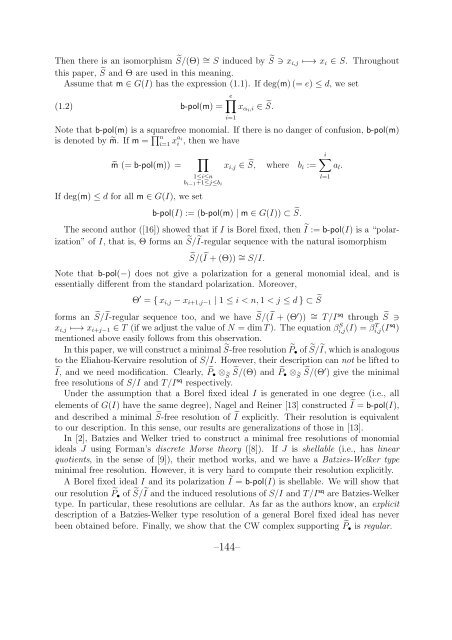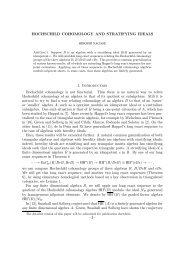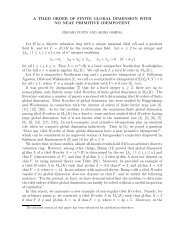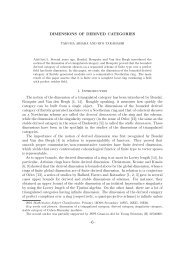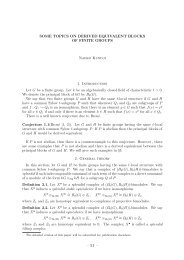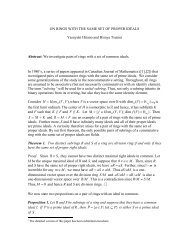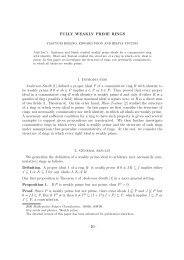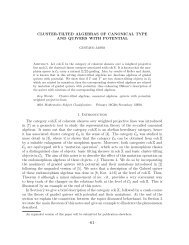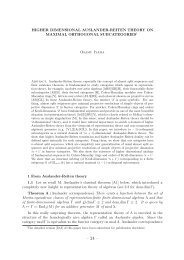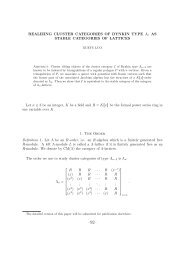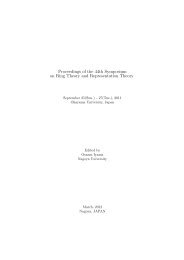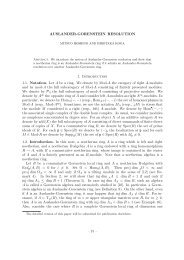Proceedings of the 44th Symposium on Ring Theory and ...
Proceedings of the 44th Symposium on Ring Theory and ...
Proceedings of the 44th Symposium on Ring Theory and ...
Create successful ePaper yourself
Turn your PDF publications into a flip-book with our unique Google optimized e-Paper software.
Then <str<strong>on</strong>g>the</str<strong>on</strong>g>re is an isomorphism ˜S/(Θ) ∼ = S induced by ˜S ∋ x i,j ↦−→ x i ∈ S. Throughout<br />
this paper, ˜S <strong>and</strong> Θ are used in this meaning.<br />
Assume that m ∈ G(I) has <str<strong>on</strong>g>the</str<strong>on</strong>g> expressi<strong>on</strong> (1.1). If deg(m) (= e) ≤ d, we set<br />
e∏<br />
(1.2) b-pol(m) = x αi ,i ∈ ˜S.<br />
i=1<br />
Note that b-pol(m) is a squarefree m<strong>on</strong>omial. If <str<strong>on</strong>g>the</str<strong>on</strong>g>re is no danger <str<strong>on</strong>g>of</str<strong>on</strong>g> c<strong>on</strong>fusi<strong>on</strong>, b-pol(m)<br />
is denoted by ˜m. If m = ∏ n<br />
i=1 xa i<br />
i , <str<strong>on</strong>g>the</str<strong>on</strong>g>n we have<br />
∏<br />
˜m (= b-pol(m)) = x i,j ∈ ˜S,<br />
i∑<br />
where b i := a l .<br />
1≤i≤n<br />
l=1<br />
b i−1 +1≤j≤b i<br />
If deg(m) ≤ d for all m ∈ G(I), we set<br />
b-pol(I) := (b-pol(m) | m ∈ G(I)) ⊂ ˜S.<br />
The sec<strong>on</strong>d author ([16]) showed that if I is Borel fixed, <str<strong>on</strong>g>the</str<strong>on</strong>g>n Ĩ := b-pol(I) is a “polarizati<strong>on</strong>”<br />
<str<strong>on</strong>g>of</str<strong>on</strong>g> I, that is, Θ forms an ˜S/Ĩ-regular sequence with <str<strong>on</strong>g>the</str<strong>on</strong>g> natural isomorphism<br />
˜S/(Ĩ + (Θ)) ∼ = S/I.<br />
Note that b-pol(−) does not give a polarizati<strong>on</strong> for a general m<strong>on</strong>omial ideal, <strong>and</strong> is<br />
essentially different from <str<strong>on</strong>g>the</str<strong>on</strong>g> st<strong>and</strong>ard polarizati<strong>on</strong>. Moreover,<br />
Θ ′ = { x i,j − x i+1,j−1 | 1 ≤ i < n, 1 < j ≤ d } ⊂ ˜S<br />
forms an ˜S/Ĩ-regular sequence too, <strong>and</strong> we have ˜S/(Ĩ + (Θ′ )) ∼ = T/I sq through ˜S ∋<br />
x i,j ↦−→ x i+j−1 ∈ T (if we adjust <str<strong>on</strong>g>the</str<strong>on</strong>g> value <str<strong>on</strong>g>of</str<strong>on</strong>g> N = dim T ). The equati<strong>on</strong> βi,j(I) S = βi,j(I T sq )<br />
menti<strong>on</strong>ed above easily follows from this observati<strong>on</strong>.<br />
In this paper, we will c<strong>on</strong>struct a minimal ˜S-free resoluti<strong>on</strong> ˜P • <str<strong>on</strong>g>of</str<strong>on</strong>g> ˜S/Ĩ, which is analogous<br />
to <str<strong>on</strong>g>the</str<strong>on</strong>g> Eliahou-Kervaire resoluti<strong>on</strong> <str<strong>on</strong>g>of</str<strong>on</strong>g> S/I. However, <str<strong>on</strong>g>the</str<strong>on</strong>g>ir descripti<strong>on</strong> can not be lifted to<br />
Ĩ, <strong>and</strong> we need modificati<strong>on</strong>. Clearly, ˜P• ⊗ ˜S<br />
˜S/(Θ) <strong>and</strong> ˜P• ⊗ ˜S<br />
˜S/(Θ ′ ) give <str<strong>on</strong>g>the</str<strong>on</strong>g> minimal<br />
free resoluti<strong>on</strong>s <str<strong>on</strong>g>of</str<strong>on</strong>g> S/I <strong>and</strong> T/I sq respectively.<br />
Under <str<strong>on</strong>g>the</str<strong>on</strong>g> assumpti<strong>on</strong> that a Borel fixed ideal I is generated in <strong>on</strong>e degree (i.e., all<br />
elements <str<strong>on</strong>g>of</str<strong>on</strong>g> G(I) have <str<strong>on</strong>g>the</str<strong>on</strong>g> same degree), Nagel <strong>and</strong> Reiner [13] c<strong>on</strong>structed Ĩ = b-pol(I),<br />
<strong>and</strong> described a minimal ˜S-free resoluti<strong>on</strong> <str<strong>on</strong>g>of</str<strong>on</strong>g> Ĩ explicitly. Their resoluti<strong>on</strong> is equivalent<br />
to our descripti<strong>on</strong>. In this sense, our results are generalizati<strong>on</strong>s <str<strong>on</strong>g>of</str<strong>on</strong>g> those in [13].<br />
In [2], Batzies <strong>and</strong> Welker tried to c<strong>on</strong>struct a minimal free resoluti<strong>on</strong>s <str<strong>on</strong>g>of</str<strong>on</strong>g> m<strong>on</strong>omial<br />
ideals J using Forman’s discrete Morse <str<strong>on</strong>g>the</str<strong>on</strong>g>ory ([8]). If J is shellable (i.e., has linear<br />
quotients, in <str<strong>on</strong>g>the</str<strong>on</strong>g> sense <str<strong>on</strong>g>of</str<strong>on</strong>g> [9]), <str<strong>on</strong>g>the</str<strong>on</strong>g>ir method works, <strong>and</strong> we have a Batzies-Welker type<br />
minimal free resoluti<strong>on</strong>. However, it is very hard to compute <str<strong>on</strong>g>the</str<strong>on</strong>g>ir resoluti<strong>on</strong> explicitly.<br />
A Borel fixed ideal I <strong>and</strong> its polarizati<strong>on</strong> Ĩ = b-pol(I) is shellable. We will show that<br />
our resoluti<strong>on</strong> ˜P • <str<strong>on</strong>g>of</str<strong>on</strong>g> ˜S/Ĩ <strong>and</strong> <str<strong>on</strong>g>the</str<strong>on</strong>g> induced resoluti<strong>on</strong>s <str<strong>on</strong>g>of</str<strong>on</strong>g> S/I <strong>and</strong> T/Isq are Batzies-Welker<br />
type. In particular, <str<strong>on</strong>g>the</str<strong>on</strong>g>se resoluti<strong>on</strong>s are cellular. As far as <str<strong>on</strong>g>the</str<strong>on</strong>g> authors know, an explicit<br />
descripti<strong>on</strong> <str<strong>on</strong>g>of</str<strong>on</strong>g> a Batzies-Welker type resoluti<strong>on</strong> <str<strong>on</strong>g>of</str<strong>on</strong>g> a general Borel fixed ideal has never<br />
been obtained before. Finally, we show that <str<strong>on</strong>g>the</str<strong>on</strong>g> CW complex supporting ˜P • is regular.<br />
–144–


